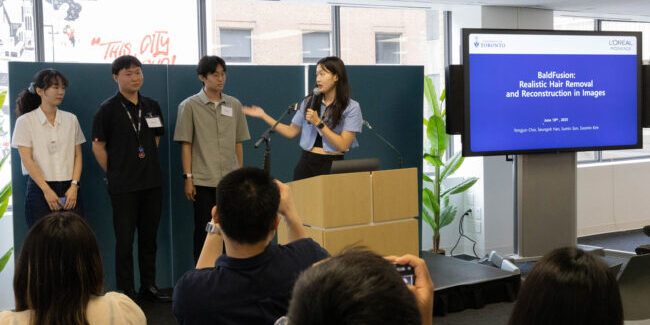Taking concrete actions to increase diversity and enhance equity among students, staff and faculty in U of T Engineering are central to the Faculty’s next five-year roadmap document, Academic Plan: 2017-2022. The Faculty is now seeking feedback on its draft Plan, which outlines its objectives for the next five years and the actions it will take to achieve those goals.
“Inclusivity and diversity are core values of U of T Engineering,” says Cristina Amon, Dean of the Faculty of Applied Science & Engineering. “This Academic Plan will set our course for the next five years, as we take meaningful action to improve gender, geographic, socio-economic and cultural representation within our community.”
Diversity is critical to the engineering creative process — it enriches the student experience and brings a plurality of perspectives to pressing global challenges. Over the past decade the Faculty has made significant progress in enhancing gender balance in its programs. For the past two consecutive years, women have comprised more than 40 per cent of the first-year entering class. The Faculty has also taken steps to create a more welcoming, equitable, and inclusive student experience across all programs, ensuring the rich diversity of the Engineering is respected at the University and into the workplace.
Building on that success, the Faculty will further develop its community and culture to ensure that inclusion, equity and respect are universal values among faculty, staff and students. It will continue to improve opportunities for underrepresented groups, particularly Indigenous and Black students, staff and faculty.
To do this, the Faculty plans to adapt and improve its recruitment and admissions process to reduce barriers to entry for students who take alternative pathways into engineering. Over the next five years, it will also emphasize representation of Black and Indigenous communities in its recruitment of new faculty members.
It will also expand its ENGage program, an initiative created by U of T Engineering Outreach office in response to a need identified by the U of T student chapter of the National Society of Black Engineers (NSBE). ENGage is a week-long summer camp that engages Black students in the Toronto District School Board with experiential workshops and activities designed to ignite a love of science, technology, engineering and math (STEM).
This year marks the 10th anniversary of the program — since its launch, more than 800 students have participated in ENGage. All instructors are current engineering students, and the majority are members of the NSBE.
Engineering’s Faculty Council has a longstanding committee responsible for community affairs and gender issues. In 2011 that group updated its terms of reference to reflect its mandate to improve and make recommendations on strategies related to recruitment and outreach, and quality of life within the Faculty community, including diversity in all its forms.
The Engineering Society, U of T Engineering’s student government, has also taken steps to improve inclusivity with the creation of the role of Equity and Inclusivity Director. Ben Kwashigah (CompE Year 2) was elected to the position for fall 2017. This semester, he and his team hosted workshops and events in collaboration with Skule™’s LGBTQ+ club QueerSphere and Students for Barrier-Free Access. He is currently planning events for the winter semester, including one in partnership with NSBE.
“The point of the equity and inclusivity position is to raise awareness of the barriers that people face. That can mean discrimination against sexual identity, race, socio-economic class or people with disabilities,” says Kwashigah, who is also leading development of an accessibility policy for the Engineering Society.
“I’m working toward more awareness, especially with leaders and club executives, because they’re the face of what Skule™ is all about. They control the events and inspire action — so it’s important that they be aware of what different groups go through.”
The draft Academic Plan is posted publicly for review and feedback — members of the U of T community may submit comments to governance.fase@ecf.utoronto.ca by Nov. 17, 2017.




